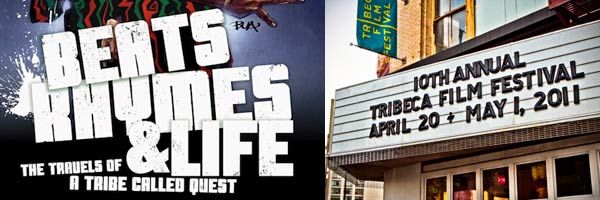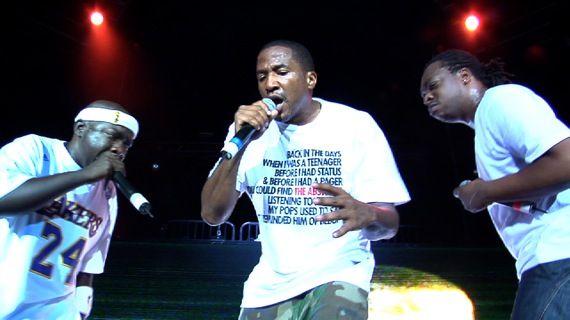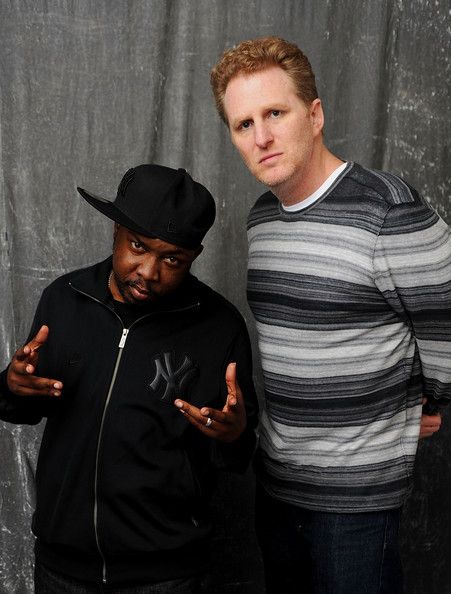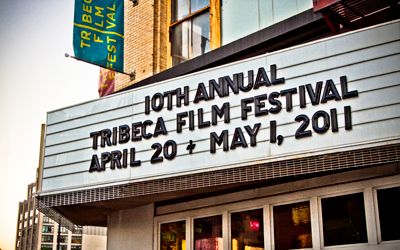After setting heads nodding and knees bouncing in unison at Sundance, Beats Rhymes & Life: The Travels Of A Tribe Called Quest got a Tribeca Film Festival crowd moving to the beat and, occasionally, to tears, for its homecoming screening. Shown in the city that gave rise to the documentary’s titular characters, the New York premiere had a distinctly family vibe.
Hit the jump for audio and highlights from one of the festival’s liveliest q&a sessions all week. Director Michael Rapaport and ATCQ members Malik Taylor (a.k.a. Phife Dawg) and Ali Shaheed Muhammad (seeing the film on a big screen for the 1st time) took the stage after the packed screening at the festival’s biggest venue: the Borough of Manhattan Community College Tribeca Performing Arts Center.
Music documentaries are a tricky endeavor. Access is key, but close proximity offers a potential conflict-of-interest for directors and many soften harsher truths to avoid being ostracized by their newfound friends. As Lester Bangs (played by Philip Seymour Hoffman) famously points out in Cameron Crowe’s 2000 film Almost Famous: “Friendship is the booze they feed you. They want you to get drunk on feeling like you belong … You wanna be a true friend to them? Be honest, and unmerciful.” Although first-time feature director Michael Rapaport was previously acquainted with the group’s members, he successfully made a film in line with Bangs’ logic to the benefit of the audience, and the band. After all, anything less than a frank depiction would ring false for a group that always prided itself on artistic integrity.
Beats Rhymes & Life (also the title of the band’s 1996 record) balances brutal honesty with a heartfelt devotion to what is widely considered to be among the most influential hip-hop acts in history. The film’s impressively frank nature is reflective of the group whose reunion it follows, as a fly-on-the-wall, during the 2008 Rock The Bells tour. It also tracks A Tribe Called Quest’s mid-1980’s formation in Queens; the evolution of the group and its four members: Kamaal Ibn John Fareed (better known as Q-Tip and formerly known as Jonathan Davis), Malik Taylor (Phife Dawg), Ali Shaheed Muhammad and Jarobi White; their close ties to fellow music innovators like De La Soul; Phife’s struggles with diabetes and his longtime collaborator, Q-Tip and the band’s eventual dissolution.
Rapaport has repeatedly said he was inspired to make the documentary because he felt that A Tribe Called Quest is to rap, what The Rolling Stones are to rock music. As such, it’s fitting that his film was influenced by the seminal Stones documentary Gimme Shelter. Rapaport (a New York native best known as an actor in films ranging from Zebrahead, True Romance, Cop Land, Higher Learning, Bamboozled and Mighty Aphrodite) is clearly a fan of the group he profiles and it shows in the ample music and placement that serves as the story’s backdrop. Rapaport and his editors Lenny Mesina and AJ Schnack seamlessly mix live concerts, music videos, talking heads and verite-style footage to craft a tight film that’s compelling from the first frame to the end of its 98-minute runtime.
Critical and fan reactions have been overwhelmingly positive, but the group’s support has been a little more complicated. Phife was a big backer from its Sundance debut and Ali Shaheed Muhammad was clearly moved by the Tribeca premiere. With support from some of the group’s family members and highly respected attendees like Fab 5 Freddy and Pharrell Williams here at Tribeca, there is a growing legion of audience members hoping Jarobi and Q-Tip’s public stamp of approval will follow. Sony Pictures Classics’ nationwide rollout begins July 8th.
Click here for audio from a very funny and entertaining post-screening q&a an/or read on for highlights.
- Phife revealed that he is, once again, doing fine, physically, and later remarked, “now that I’m better, the world is in trouble.” Also, he has the EP “Songs In the Key of Phife – Eight Is Enough” coming out this summer with a follow up LP “Songs In The Key Of Phife – Cheryl’s Big Son” on the way (his mother Cheryl was in attendance). He also said he’s working on the pilot of a sports talk show called “Fanalyst” and “as far as Tribe, let’s take it one step at a time and enjoy this movie.”
- Ali Shaheed Muhammad clarified the often misquoted “Electric Relaxation” lyric to a fan, as “relax yourself/girl, please settle down,” before the crowd took part in a call-and-response with the group.
- Rapaport spoke of his motivation to make the film. In 1998, he attended Tribe’s last show (before the 2008 Rock The Bells tour) and joked that he felt “like my parents are getting divorced… again.” He said the group, along with acts like Eric B. & Rakim, Jungle Brothers and Big Daddy Kane were like superheroes to him, as a kid. He compared Tribe’s influence on hip hop to that of The Beatles and The Rolling Stones on rock & roll and said “I really wanted to go back and find out what (Tribe’s) story was.”
- Rapaport credited the work of his cinematographers Robert Benavides and Debra Koffler. He said they mainly shot with an HVX, but mixed in 16mm footage. He reasoned the 16mm was needed because “if you’re making a film, there’s gotta be one frame of actual film.”
- Phife shocked the crowd by saying the song fans love, but the band hates performing is “Can I Kick It?” While he was grateful for what the early hit did for the group, Phife exclaimed, “I hate that motherf---ing song.” While crediting Lou Reed for the “Walk On The Wild Side” sample, Phife reasoned “we sampled that record back in (1990) for (the CD) “People’s Instinctive (Travels And The Paths Of Rhythm). We ain’t seen no money off that s--t, yet” but “we’ll get tomatoes if we don’t do that s--t.” Muhammad joked, “That was quite shocking. I didn’t know that” though “it was because of that song that MTV really embraced us.” Phife added that De La Soul similarly hates its own smash hit “Me, Myself & I” but performs it for a similar reason.
- Rapaport said the hardest part, so far, of making Beats Rhymes & Life was the “daunting” editing process. Also, “music clearances were really frightening … We should’ve (done) a short film called ‘Michael Rapaport is shared s—tless trying to clear A Tribe Called Quest music’ because we’d cut scenes around songs and then they’d be like ‘you can’t clear the song’ and that was a really challenging thing. I mean, making a film is hard, making an independent film is harder and making a music documentary about hip hop is really hard.”
- Phife joked that the hardest part for him was “being around Michael Rapaport. This dude is crazy.” He somberly added that it was toughest to allow his struggle with diabetes to be depicted. However, by the end of filming, he had an intense trust of Rapaport and that he “could tell him certain things … I really trusted him with 20 years of our lives.” Similarly, Muhammad said re-living Phife’s kidney replacement surgery was the toughest part of filming for him, along with being followed by cameras and answering a series of questions that he didn’t always know where it was leading.
- Muhammad’s sister made a surprise appearance after the film to thank Rapaport and the group for the film. She said, even though she grew up with them, “there were parts of their professional development, I didn’t know … You did a good job of just showing, with integrity and honesty, the relationship.” She referenced the consensus for a Tribe reconciliation, “time is linear and sometimes how people reveal themselves and how situations unfold (are) always easier to see (in hindsight) and by then you’ve developed feelings or sentiments that you almost wish you didn’t develop.” She added, “you’ve got the rest of your lives to go” and “with time you end up forgiving some things.”




